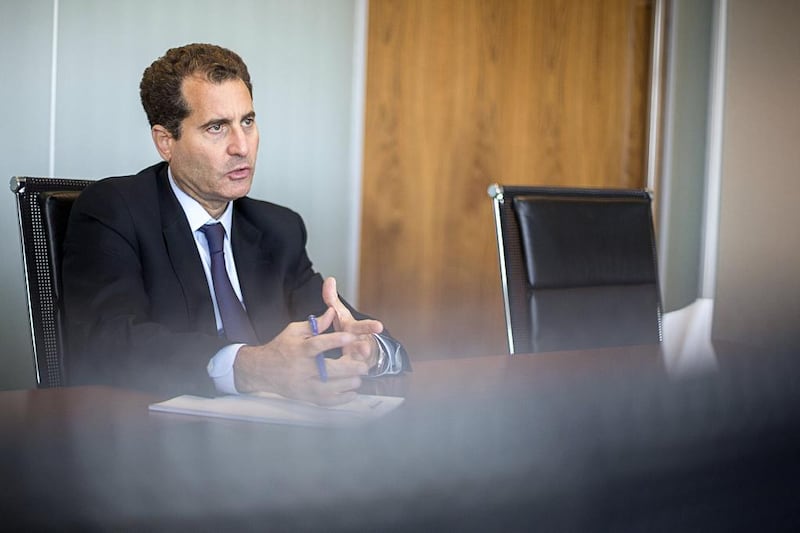What I like about consultants is that they are seldom short of an opinion. They spend a lot of time thinking hard and scientifically about big issues, and are in a very good position to deliver insightful judgments on many interesting subjects.
What I don’t like about them is that their insights are often obscured by the jargon of the industry. If consultants, according to the old joke about the profession, are people who borrow your watch to tell you the time, you might add that they then translate the simple time of day into their own pretentious and meaningless argot.
Richard Shediac, managing director for Strategy& in the Middle East, is a refreshing change. Sure, he can use the jargon acquired over a 15-year career in consulting. But he seems to appreciate the need to then translate into layman’s language.
“We want to be known as the ‘capabilities firm’,” he says, in a classic example of jargon. But then he goes on to explain in concrete detail what that means for the firm and for the client.
“For example, if the client is a bank that wants to enhance its SME business, we might focus on their capability in credit scoring. That’s a key function that will be essential to them in assessing SME lending, and therefore they have to be good at it.
“It is a very specific capability, and they have to be excellent at fulfilling it. All the other things, like HR, treasury and procurement, for example, they just have to be good at. For them in the SME space, it’s the key capability.”
I get that. It’s part of the “strategy to execution” approach Strategy& has adopted as its basic business ethos in the year since it has been operating under that name, which also needs some explanation.
The firm grew out of Booz Allen Hamilton (BAH), one of the oldest of the big management consultants. BAH decided to spin off most of its commercial business as Booz & Co, which was eventually sold to the international accounting firm PwC in 2013, then rebranded as Strategy&.
The new name attracted some criticism as another bit of meaningless consultant-speak, but Mr Shediac explains the rationale quite succinctly. “We obviously work on strategy, so that’s self-explanatory. But the ampersand allows us to add suffixes like ‘execution’ or ‘technology’. We’ve lived with it for a year now, and it’s interesting and different,” he says.
The other essential part of the branding is the phrase “part of the PwC network” emblazoned over the logo in the firm’s Middle East headquarters on Al Maryah Island in Abu Dhabi. The deal with PwC, Mr Shediac explains, gives the firm a unique product offering in the crowded consultancy market, dominated by the firms groups together under the “MBBB” banner – McKinsey, Bain, Boston and Booz.
“We complement PwC’s existing consulting business, but it also enhances the execution side of the equation. It makes for a strong deals capability, typically with PwC supplying the financial due diligence, and us the commercial,” he says. It also opens up a potentially lucrative pool of potential clients among PwC accounting and auditing clients, which comprise some of the biggest companies in the world. “We leverage each others’ relationships,” he admits.
It’s all about the clients in the end. Mr Shediac will not identify them, as is common practice among consultants, but he talks about the “big blue chips that cover all sectors”, among them energy, infrastructure, technology, health and finance (his own speciality with his background in banking).
Direct public sector clients, in the form of government departments or ministries, form only about 20 per cent of the total, although he admits there is an overlap in the region between public and private in the form of corporates with big government shareholdings. “Big companies like Saudi Telecom, or Adnoc, or a bank are normal businesses, who owns them is irrelevant.”
He was part of the team that helped Abu Dhabi produce its Vision 2030 document in 2009, mapping out the economic development plan for the next two decades.
A lot has changed in the region and the world since that document was produced, notably a global financial crash and the recent decline in the price of oil. Is it still relevant today?
“I think it is still on track directionally. But that kind of work needs to be updated every five years or so. Obviously a lot has changed – the global banking model has changed radically, and energy too, although we didn’t try to project energy prices ahead when we were doing the original strategy. The focus was on non-oil and economic diversification.
“But my own personal view is that energy revenue is not an issue for Abu Dhabi. It already has the funds. I think spending will be maintained around social and physical infrastructure, those areas that are essential. But non-essential spending will have to be prioritised.”
Does that include spending on consultants? “We haven’t seen any impact yet, and we won’t see it until it turns out that much lower oil prices are going to be long term. Another year of low prices will affect government spending, I believe.”
If that is the case, how will Strategy& differentiate itself in the contest with MBBB, all of which are competing for similar lucrative contracts? “We are in a unique position, because of the link-up with PwC, to make the ‘strategy and execution’ plan work, compared to them”, he says.
fkane@thenational.ae
Follow The National's Business section on Twitter





